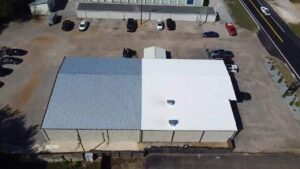
In the world of commercial construction, the roof is a critical component that protects the building and its occupants from the elements. When it comes to roofing options, steep slope roofing stands out as a popular choice for many commercial buildings. This article will explore the key features, benefits, materials, installation process, maintenance, and cost considerations of Cordova Commercial Steep Slope Roofing.
Understanding Steep Slope Roofing
Steep slope roofing refers to roofing systems that have a pitch greater than 2:12, which means the roof rises at least 2 inches for every 12 inches of horizontal distance. Its unique design and construction make it ideal for shedding water, snow, and debris, making it a durable and reliable option for commercial buildings.
When it comes to steep slope roofing, the pitch of the roof plays a crucial role in its functionality. The steep angle allows for efficient water drainage, preventing water from pooling on the roof and causing potential leaks. This design feature is especially important in areas prone to heavy rainfall or snow accumulation, as it helps maintain the structural integrity of the building over time.
Key Features of Steep Slope Roofing
One of the primary features of steep slope roofing is its ability to effectively channel water away from the building. This not only prevents water damage but also helps to maintain the structural integrity of the roof. Additionally, steep slope roofing offers excellent aesthetics, allowing for various design options to enhance the overall curb appeal of the commercial building.
Another key feature of steep slope roofing is its versatility in accommodating different roofing materials. From traditional asphalt shingles to more modern metal roofing options, steep slope roofs can be customized to suit the specific needs and style preferences of the property owner. This flexibility in material choices allows for creative design possibilities while ensuring optimal performance and longevity.
Benefits of Steep Slope Roofing for Commercial Buildings
There are several benefits to choosing steep slope roofing for commercial buildings. Firstly, it provides superior protection against water leaks, reducing the risk of interior damage and mold growth. Secondly, the pitched roof design allows for improved ventilation, which can help regulate temperature and reduce energy costs. Lastly, the durability of steep slope roofing extends the lifespan of the roof, resulting in long-term savings for property owners.
Furthermore, steep slope roofing can enhance the overall value of a commercial property by adding visual interest and architectural appeal. The dramatic angles and varied textures of a steep slope roof can make a building stand out in its surroundings, attracting potential customers or tenants. This aesthetic advantage, combined with the practical benefits of steep slope roofing, makes it a popular choice for a wide range of commercial applications.
Materials Used in Steep Slope Roofing
There are various materials available for steep slope roofing, each with its own unique characteristics and advantages. Here are some commonly used materials:
Asphalt Shingles
Asphalt shingles are the most popular choice for steep slope roofing due to their affordability, versatility, and ease of installation. They are available in different styles, colors, and textures, allowing property owners to achieve their desired aesthetic.
Asphalt shingles are composed of a base material, such as fiberglass or organic felt, coated with asphalt and embedded with ceramic granules. This construction provides protection against UV rays and helps to prolong the lifespan of the roof. Additionally, asphalt shingles are lightweight, making them suitable for a wide range of roof structures.
Metal Roofing
Metal roofing is known for its exceptional durability and longevity. It can withstand extreme weather conditions and offers excellent fire resistance. Metal roof panels are available in various designs, including standing seam, corrugated, and metal shingles, providing flexibility in design choices.
One of the key advantages of metal roofing is its sustainability. Metal roofs are often made from recycled materials and are fully recyclable at the end of their lifespan, making them an environmentally friendly choice. They also have high solar reflectance, reducing heat absorption and energy costs for the building.
Slate and Tile Roofing
Slate and tile roofing are renowned for their timeless beauty and durability. They offer excellent resistance to fire, wind, and impact. These natural materials can enhance the architectural appeal of commercial buildings, making them an attractive option for those seeking a high-end aesthetic.
Slate is a natural stone material that is split into thin sheets to create roofing tiles. It is highly durable and can last for over a century with proper maintenance. Tile roofing, on the other hand, is available in various materials such as clay, concrete, and metal, offering different aesthetic options to suit different architectural styles.
Installation Process of Steep Slope Roofing
Pre-Installation Considerations
Prior to the installation of steep slope roofing, several factors need to be considered. These include the local building codes, structural integrity of the roof, and the selection of appropriate underlayment materials. Additionally, it is essential to work with experienced professionals who have expertise in steep slope roofing installation.
Step-by-Step Installation Guide
The installation process of steep slope roofing involves several steps. Firstly, the existing roof materials are removed to prepare the substrate. Then, underlayment, such as synthetic or felt paper, is applied to provide an extra layer of protection. Next, the selected roofing material is carefully installed, ensuring proper alignment, fastening, and sealing. Finally, necessary finishing touches, such as flashing and trim, are added to complete the installation.
Maintenance and Repair of Steep Slope Roofing
Regular Maintenance Tips
Maintaining a steep slope roof is crucial for its longevity and performance. Regular inspections should be conducted to identify any signs of damage, such as loose or missing shingles, cracked tiles, or damaged flashing. Keeping the roof clean from debris and ensuring proper drainage is also important to prevent water pooling and potential leaks.
Identifying and Repairing Common Issues
When issues arise with steep slope roofing, it is essential to address them promptly to prevent further damage. Common issues include leaks, ice dams, and storm damage. Professional roofing contractors should be consulted to identify the root cause of the problem and provide appropriate repairs.
Cost Considerations for Steep Slope Roofing
Initial Installation Costs
The cost of installing a steep slope roof varies depending on factors such as the chosen material, the size of the roof, and local labor rates. Asphalt shingles tend to be the most cost-effective option, while slate and tile roofing are generally more expensive due to their higher material and installation costs. Metal roofing falls in the middle range but offers excellent durability and longevity.
Long-Term Maintenance Costs
While steep slope roofing requires regular maintenance to ensure its longevity, the costs associated with maintenance are relatively low compared to the benefits it provides. Proper maintenance can help identify and address minor issues before they become major problems, saving property owners from costly repairs or premature roof replacement.
In conclusion, Cordova Commercial Steep Slope Roofing offers numerous advantages for commercial buildings. Its key features, including superior water shedding capabilities, enhanced aesthetics, and durability, make it a reliable choice for protecting commercial structures. With a variety of materials available, property owners can choose the option that best suits their requirements and budget. Professional installation and regular maintenance ensure the longevity and performance of steep slope roofing, providing cost-effective solutions for commercial roofing needs.
Ready to elevate the protection and appeal of your commercial property with a steep slope roofing system? Look no further than Commercial Roofing Rana, your trusted partner in the Mid-South for top-tier commercial roofing services. With our expertise in Duro-Last roofing systems, we ensure a perfect fit and superior protection for your building. Serving Tennessee, Kentucky, Mississippi, and Arkansas since 1983, our licensed professionals are committed to delivering exceptional results that safeguard your employees, customers, and assets. Don’t let water damage threaten your investment. Schedule Now with Commercial Roofing Rana and secure your property’s best line of defense against the elements.
